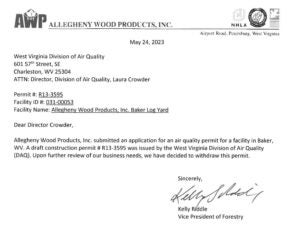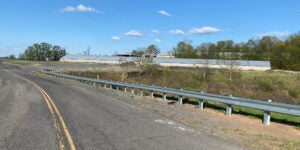Allegheny Wood Products — which had sought an air quality permit to build a new timber fumigation facility despite an outcry from residents in Hardy County, West Virginia — has formally withdrawn its application for the project, citing “a further review of its business needs.”
Steven Pursley, a Division of Air Quality evaluator with the West Virginia Department of Environmental Protection, sent out a notice Thursday afternoon that the agency has accepted the withdrawal.
“To receive a state air quality permit for a log fumigation facility, regardless of its location, AWP would have to submit a new air quality permit application and restart the WVDEP’s permitting process, which requires public notice and comment,” Pursley said.

This is significant because events over the past several weeks revealed the depth of the community’s feelings toward putting another fumigation facility in the county. The facility, which was to be built on Park Farm Drive near the town of Baker, raised concern because of the site’s proximity to occupied dwellings and agricultural land. Timber fumigation of logs uses a highly toxic and ozone-depleting pesticide known as methyl bromide, which makes the logs less likely to transmit contaminants, particularly when shipped overseas.
In April, after the Division of Air published a notice of its intent to approve the permit — the first of several steps required to actually get the facility built — the community rallied to voice its objections through letters to the editor and at a virtual public hearing held May 4.
For Miles Park, whose father used to farm the land on which the facility was to be built, the news of an application withdrawal comes as a relief.
“The built-up emotional release of this is so hard to explain,” Park said. “For the last month and a half, I didn’t know what my family’s future would be — whether we would be slowly poisoned or have to give up the place we call home to move away to prevent it. I feel like we just won the biggest fight of our lives. And I want to thank all of my family, friends, and neighbors for all of the support and standing up with us. People I never knew came forward to help fight! It’s great to live in a community like this!”

Despite the public’s disapproval of the fumigation facility, Pursley said that public sentiment, human health, water quality, property values, economic impact, traffic patterns, and more were not allowed to be considered by the agency when weighing the permit.
However, among the things that did cause major sticking points was that the address of the permit application did not match the mapped location that Pursley listed in his intent-to-approve permit evaluation. Pursley conducted his review virtually using Google Earth coordinates. The location that Pursley mapped based on those coordinates was a property owned by the West Virginia Division of Highways and was adjacent to the property whose address was listed in the application.
Furthermore, the land in question is currently zoned agricultural, and a fumigation facility would require rezoning to be industrial, something that Hardy County Planning Commissioner Melissa Scott made clear during public comments that she was reluctant to see happen.
Hardy County has a population of about 14,000 and is located in West Virginia’s northeastern panhandle, bordering Virginia. Allegheny Wood Products already operates one timber fumigation site in the county and, until recently, had two.
The permit for the proposed Baker facility said the company planned to use no more than 9.55 tons of methyl bromide per year, qualifying it as a “minor source” of air pollution. The threshold for becoming a “major source,” according to the Division of Air Quality, is 10 tons per year, which would have opened the company up to significantly more regulation.
About 20 states regulate the use of methyl bromide in log fumigation, according to the Southern Environmental Law Center. According to Dr. Marshall White with Virginia Tech, the use of methyl bromide has been fully banned around many large population centers in Hawaii and Maryland, including the Baltimore region, which makes launching points such as eastern West Virginia a prime choice for timber companies readying their logs for overseas shipping.
Ryan Tipps is the founder and managing editor of AGDAILY. The Virginia Tech graduate has covered farming since 2011, and his writing has been honored by state- and national-level agricultural organizations.



